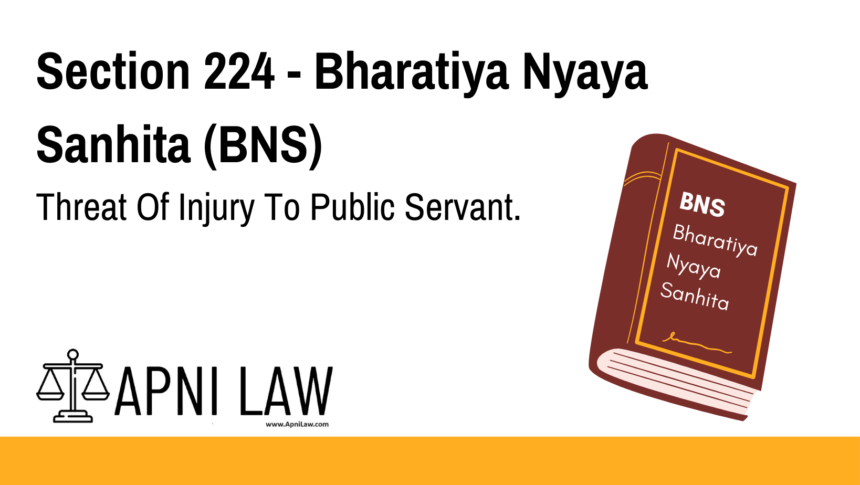Code: Section 224 BNS
Whoever holds out any threat of injury to any public servant, or to any person
in whom he believes that public servant to be interested, for the purpose of inducing that
public servant to do any act, or to forbear or delay to do any act, connected with the
exercise of the public functions of such public servant, shall be punished with imprisonment
of either description for a term which may extend to two years, or with fine, or with both.
Explanation of Section 224 BNS
Section 224 of the Bharatiya Nyaya Sanhita, 2023 (BNS) deals with threats or coercion against public servants. It ensures that public officials can perform their duties without fear of intimidation or harm.
Key Aspects of Section 224 BNS
- Threat to Public Servant: The offense involves threatening a public servant or someone they are interested in.
- Inducing an Official Act: The threat must be aimed at influencing the public servant to perform, delay, or abstain from an official duty.
- Punishment:
- Imprisonment → Up to 2 years
- Fine → As decided by the Court
- Both → In severe cases
Illustration
Example 1: Threatening a Police Officer
A person threatens a police officer with harm to their family if they do not drop an investigation. This act falls under Section 224 BNS.
Example 2: Threatening a Government Official for a Favor
A businessman threatens a municipal officer to approve illegal construction, or else they will face consequences. This is an offense under this section.
Example 3: Intimidating a Judge
A person warns a judge that they will face harm if they do not rule in a specific manner. Such threats fall under Section 224 BNS and may lead to imprisonment.
Common Questions and Answers on Section 224 BNS
1. What constitutes a “threat of injury” under this section?
A “threat of injury” can be physical, financial, or reputational harm intended to coerce a public servant.
2. Can a mere verbal threat be punished under Section 224 BNS?
Yes, even a verbal or written threat can be considered an offense if it intends to influence a public servant’s actions.
3. Is this offense bailable?
Yes, offenses under Section 224 BNS are generally bailable, but the severity of the threat can influence bail decisions.
4. Can a person be charged if they did not act on their threat?
Yes, the existence of the threat itself is enough for legal action, even if it was not carried out.
Conclusion
Section 224 BNS safeguards public servants from coercion and threats, ensuring they perform their duties without undue influence. It upholds the integrity of public institutions and prevents intimidation tactics.
For expert legal insights, visit ApniLaw today! 🚀








